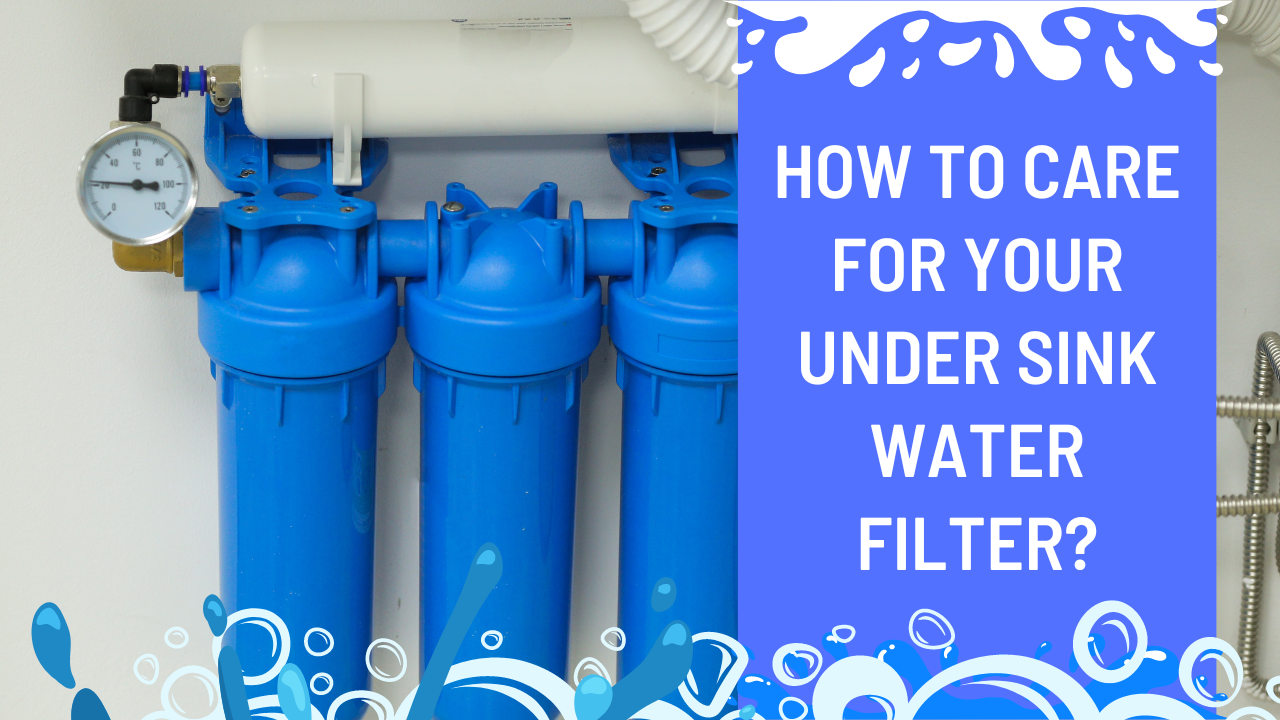An under sink water filter is a powerful filtration system designed to provide clean, great tasting drinking water from the convenience of your own home. Installing an under sink water filter removes contaminants like lead, chlorine, and other chemicals from tap water, as well as providing protection against bacteria and microorganisms. An under sink filter can last up to five years with proper maintenance, and can provide a safe, clean water supply for your family.
Part 1: Understanding Your Under Sink Water Filter
Components of an under sink water filter: in points
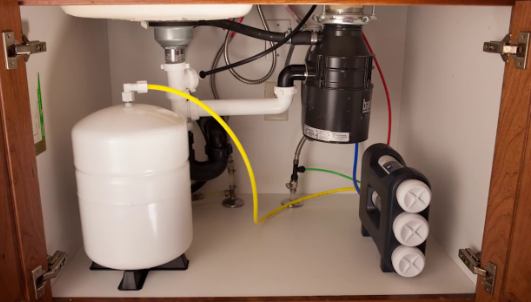
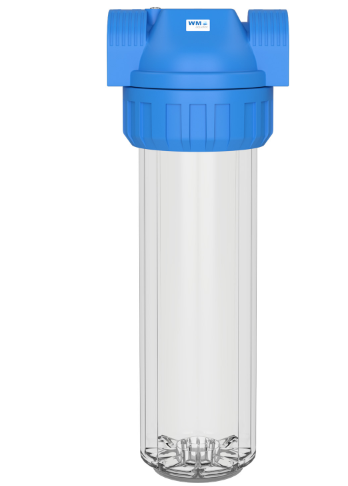
– Filter Housing: this is where the filter cartridge is stored. It’s usually made of plastic or metal and contains a flange to attach the filter unit to your sink.
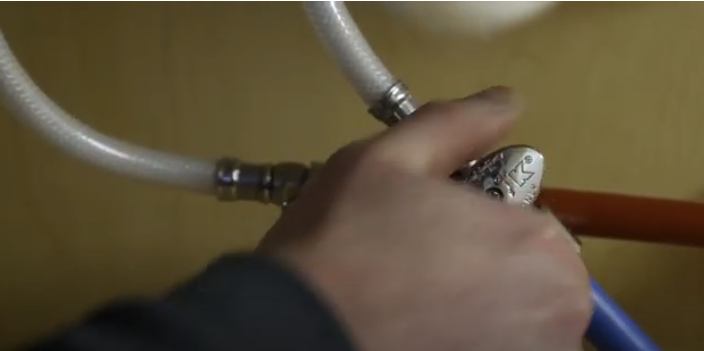
– Shutoff Valve: this controls water flow into the filter system, allowing you to turn on/off water supply without disturbing the filter cartridge.

– Filter Cartridge: this contains the filters that purify and filter the water. The type of cartridge used will depend on the type of contaminants you’re trying to remove.
– Faucet or Tap: this is where filtered water comes out and connects to your sink. It can be either a dedicated faucet installed alongside your existing tap or a diverter valve linked to the main tap.
– Connecting Hoses: these are used to connect the filter system components together and link them up to your sink.
How an under sink water filter works?
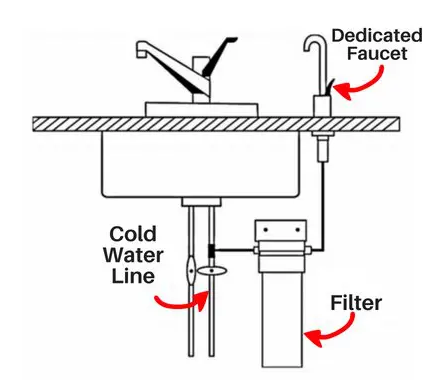
An under sink water filter is a type of point-of-use filtration system—meaning that it filters out contaminants from the water as it comes directly out of your tap. Such systems work by passing your tap water through multiple layers of filtration media, including sediment, carbon block or granular activated carbon. This process effectively reduces contaminants such as chlorine, lead, VOCs and cryptosporidium.
Different types of under sink water filters: in points
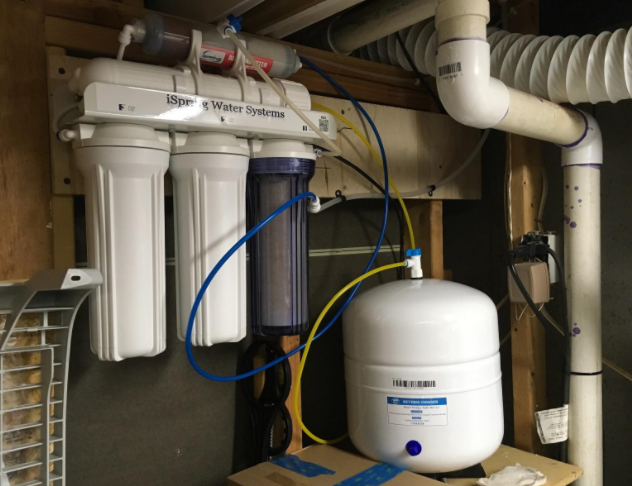
– Reverse osmosis systems: These are the most common type of under sink water filters and use a membrane to filter out contaminants. The membrane will remove bacteria, cysts, organic compounds, and other contaminants from the water.
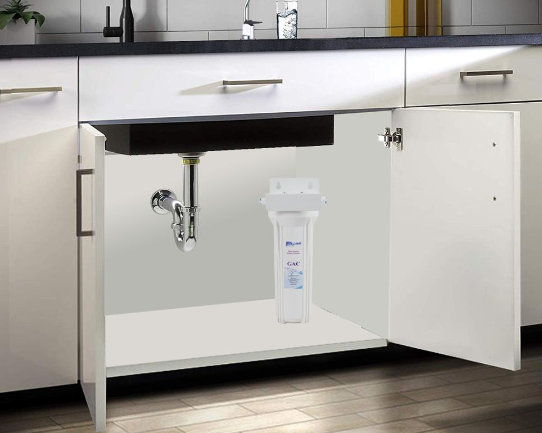
– Granular activated carbon (GAC) filters: GAC filters use activated carbon granules to filter out chlorine, sediment, volatile organic compounds (VOCs), and other contaminants.
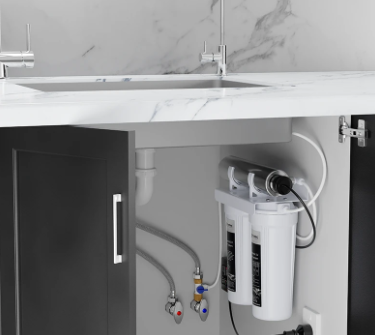
– Ultraviolet or UV filters: UV filters use ultraviolet light to kill bacteria, viruses, and other microorganisms in the water. UV filters cannot remove chemicals or heavy metals from the water, so they should be used in combination with other types of filters for optimal water filtration.
How to care for Your Under Sink Water Filter?
Regular maintenance schedule: It is important to keep up a regular maintenance schedule for your under sink water filter.

Cleaning and replacing filter cartridges: You must clean and replace the filter cartridge of your under sink water filter system on a regular basis. Cleaning is necessary to remove sediment, rust and other contaminants that may have built up inside the filter over time. Replacing the cartridge will ensure the highest level of filtration so that your water remains safe for drinking and cooking. When cleaning the filter, use only water or mild detergent and avoid abrasive cleaners. When replacing the filter cartridge, make sure to choose a type and size that is compatible with your system. Additionally, you should follow the manufacturer’s instructions when installing or removing the cartridge.
Regularly checking for leaks: It is also important to regularly check for any potential water leakage in order to prevent any damage from occurring. Look for signs of wetness at the base of the filter or any other area where water may be able to escape. If you do detect a leak, take action immediately and contact a professional if necessary.
flushing the filter system: To ensure that your filter system continues to perform optimally, it is important to flush the filter at least once a month. This can be done by running cold water through the faucet for about two minutes. This will help remove any buildup of sediment or dirt in the filter and keep it working properly.
Replacing O-rings and seals: The O-ring is an important part of the filter system, as it creates a tight seal between the base and canister. This helps to ensure that all contaminants are properly filtered out during water filtration. Over time, these seals may start to degrade, leading to leaks in the system. Anytime you replace your filter cartridge , it is important to also check the O-ring and seals for any signs of wear or damage. If needed, they should be replaced.
Maintaining the water pressure: A key aspect of having an under sink water filter is making sure the correct water pressure is maintained. If the pressure drops, then it could lead to a decrease in filtration efficiency or water quality. Checking for sediment build-up and ensuring that all connections are secure will help to maintain the proper water pressure.
Part 3: Troubleshooting Common Issues with Under Sink Water Filters
Low water pressure: One of the most common issues with under sink water filters is low water pressure. This can be caused by a few different things, including clogged filters, blocked pipes, and damaged valves. Before calling a plumber or replacing your filter, try to clean the filter cartridge and inspect the pipes for any blockages.
- Foul odor or taste in filtered water: This can be caused by a buildup of bacteria in the filter or sediment build-up. To fix this, you should replace the filter and flush out your system with clean water to remove any buildup. You may also want to sanitize your filter cartridge with a sanitizer such as chlorine.
- Leaks: Leaks in your under sink water filter can cause both damage to your home and a decrease in the quality of filtered water coming out of the unit. Inspect the connections between the filter and faucet, as well as any tubes or hoses connecting various components regularly for signs of leaking. Use plumber’s tape around threaded connection points to ensure a tight, watertight seal. If the leak persists, consider replacing the filter entirely.
- Clogging: If your filter is not regularly maintained, it can become clogged with dirt and debris. To avoid a clog, make sure to change the filters on schedule. If you notice decreased water flow from the tap or an unpleasant odor coming from your sink, these may be signs of a clogged filter. Inspecting the filter will tell you whether or not it needs to be changed.
- Noisy operation: If your under sink water filter is making more noise than usual, check to make sure that the filter housing is securely fastened and sealed. Ensure that all air gap plumbing connections are tight and free of leaks. If these steps do not help, replace the filter cartridge.
FAQs
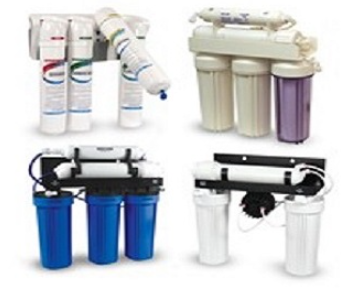
What are different types of water filters?
There are many types of water filters available, including reverse osmosis, activated carbon block, countertop filter systems, and under sink water filters. Each type has its own advantages and disadvantages, so it is important to research to find which one best fits your needs.
Can I install whole house water filter on well water?
Yes, you can install a whole house water filter on well water. However, before doing so, it is important to ensure that the particular model of filter you choose is compatible with well water.
WHAT ARE THE BEST FAUCET WATER FILTERS?
When it comes to choosing a faucet-mounted water filter, there are several factors you should consider. The best filters will be certified by an independent third party such as NSF International (NSF) and will meet or exceed the standards set forth by the Environmental Protection Agency (EPA). Additionally, look for filters that reduce chlorine taste and odor, lead, bacteria and other contaminants. The best faucet water filters are also easy to install, use and maintain.
iS IT WORTH GETTING A UNDER SINK WATER FILTER?
If you’re looking for a reliable and effective way to filter your tap water, then a under sink water filter is definitely worth considering. The advantages of having an undersink water filter are numerous – from improving the taste and odor of your drinking water to protecting yourself and your family from potentially harmful contaminants. Under sink filters can also help reduce limescale and sediment build-up in your home’s pipes, which can lead to plumbing problems further down the line.
Conclusion
Caring for your under sink water filter does not have to be difficult. It is essential that you clean and replace the filter regularly, store it correctly, and follow any instructions provided with the filter itself. Doing so will ensure that your under sink water filter continues providing you with delicious, pure, filtered water for years to come!

Meet Jeffrey B Roberts, your dedicated guide into the realm of water science and technology. As a hydro biologist with an insatiable curiosity, Jeffrey’s journey has been one of unraveling the mysteries of water systems and advocating for clean, safe water for all.
With an academic background steeped in the sciences, Jeffrey’s passion lies at the crossroads of science, technology, and nature. A deep fascination with plants and genetics has not only enriched their understanding of aquatic ecosystems but has also propelled them into the world of water softening solutions.
Believing that clean water is a basic human right, Jeffrey’s writing transcends the technicalities, making the intricate world of water softening accessible to all. Through their blog, they ardently share insights, tips, and breakthroughs, empowering readers to make informed decisions about their water quality.
Beyond his role as a prolific writer, Jeffrey is a respected figure in the hydronics industry education. With years of hands-on experience, they serve as an adjunct professor, nurturing the next generation of experts at the Thaddeus Stevens College of Technology. His involvement on the Technical Advisory Board further cements their dedication to pushing the boundaries of innovation in water technology.
